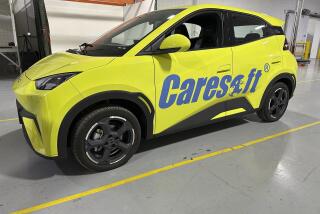GM comes closest to being truly ‘American-made’; Toyota ranks high
What automotive brands and models come closest to the claim that they are American made?
The American University’s Kogod School of Business analyzed 253 cars, trucks and SUVs for sale in the U.S., and the answers may surprise you.
Tied for first place with a score of 88.5 out of 100 is a trio of General Motors crossovers that have helped boost the automaker’s sales: the GMC Acadia, Buick Enclave and Chevy Traverse.
Photos: The most American cars and trucks
That threesome tops such well known and iconic brands as the Chevy Corvette (85) and the Ford Mustang (85).
The most popular pickup truck line in America, the Ford F-Series, tied for the second highest ranking (87.5) with the somewhat less well-known Dodge Avenger car.
Among overseas companies, Toyota claimed made-in-America bragging rights over Honda. Toyota was led by its Avalon luxury sedan (81), Camry sedan (78.5), Tundra pickup (78.5) and Sienna van (78.5).
The Avalon came in one point above the Ford Taurus (80.)
The exhaustive analysis was done by professor Frank DuBois, an expert in global supply chain management.
DuBois’ interest in such things dates as far back as his youth in Virginia Beach, Va., when he happily toiled over his own Volkswagen, looking over his dad’s shoulder and then later when working in a garage.
DuBois’ curiosity was also tweaked when replacement parts were no longer made in Germany, but in South America. Sometimes, the mufflers had to be hammered into place rather than fitting smoothly.
“That is when I became quite sensitive to country of origin for automotive parts and the impact of that. Installing a muffler went from a 20-minute operation to as long as four hours,” DuBois said.
The scoring is based on a 100 scale.
Up to 50 of those points come from the National Highway Traffic Safety Administration’s American Automobile Labeling Act scores, which counts a vehicle’s U.S.-Canadian parts content for body, interior, chassis and electrical parts.
The other 50 points included the following:
- 14% or up to 14 points if the engine was made in America; 0 points if it wasn’t.
- 11% or 11 points for inventory, capital and other expenses if the vehicle was assembled in the U.S.; 0 points if it wasn’t.
- 7% or 7 points if the transmission was U.S.-produced; 0 points if it wasn’t.
- 6% or 6 points for profit margin if it was a U.S. company; 0 points if it wasn’t.
Six points were possible for both research and development and for labor, if it was assembled in the U.S.
One notable omission from the list was the Tesla Model S electric sedan. DuBois didn’t even realize it wasn’t on there until he was asked why the Tesla wasn’t included.
It hadn’t showed up on the list provided provided by federal officials on the American Automobile Labeling Act for American and Canadian content levels.
That was perhaps because sales for the Model S began only last June and didn’t really ramp up until the first quarter of this year.
The highest-ranking European brand and model was the Daimler Mercedes GL (42.5)
Lamborghini, Lotus, Maserati, Aston Martin and Ferrari each got one point for research and development work.
Du Bois said he wasn’t surprised that there no longer appears to be any vehicle on the road today that is fully American made.
“When was the last fully American car made in the U.S., with zero Canadian or Mexican content? I really don’t know,” DuBoais said. “I think you would have to go pretty back far in years to find that.”
ALSO:
Faulty airbags in recall can spray shrapnel
Automotive legend soups up Humvees for the military
Experts predict California summer gas prices as low as $3.84
More to Read
Inside the business of entertainment
The Wide Shot brings you news, analysis and insights on everything from streaming wars to production — and what it all means for the future.
You may occasionally receive promotional content from the Los Angeles Times.











